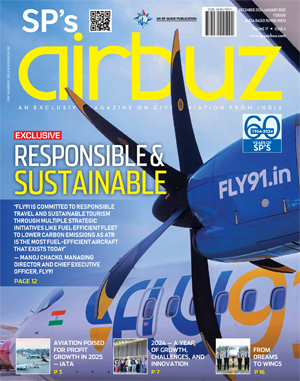Expert Speak - Hope there will be less of Red-Tapism
A variety of factors—ranging from infrastructural bottlenecks to an inflexible bureaucracy—has long stymied the growth of Indian business aviation, preventing it from achieving its huge potential. Now that a stable government is in place in Delhi, hopes have been raised that systemic shortcomings will be tackled with much-needed determination. SP’s Chief Special Correspondent Sangeeta Saxena spoke to industry bigwigs to garner suggestions and opinions on how best to go about the task.

SP’s Aviation (SP’s): How do you rate the current business aviation environment in India?
Nigel A. Harwood (NH): I have always felt that business aviation is a poor relation of civil aviation. It’s not promoted well. But it is growing at a rapid rate of 10 per cent to 15 per cent annually. Hence, it needs a lot of attention from the authorities.
SP’s: Enumerate two short and long term goals each for the business aviation industry in India.
NH: Short term goals could be to have fixed base operations and create a better job market for the locals. We already have 10 per cent to 15 per cent jobs in the general aviation sector out of the complete aviation industry in India. We should think of more employment generation. Two most important long term goals would be to reduce the bureaucratic hurdles for general aviation. Today, a corporate flight from abroad needs nearly 10 days to get a clearance to land at the airport at Delhi and a further one month for a trip to the Taj Mahal. Which MD or CEO can stay in India for so long? Even for domestic corporate travel the clearances take about three days. The other long term goal could be to market the concept of business aviation to clients of all levels.
SP’s: Who are your clients?
NH: HCL, Reliance, Oberoi, Tata, Kingfisher and the Uttar Pradesh government, to name a few. We sell and service Hawker Beechcraft which is in great demand with the higher echelons.
SP’s: Does fractional ownership constitute private ownership?
NH: In India, no. The mental setup of the clients here is such that they don’t believe in sharing the aircraft. All owners want the aircraft exclusively for themselves and at their beck and call.
SP’s: What are the cost and recurring expenditures involved?
NH: The cost of buying is dependent on the manufacturing company and, therefore, is variable. Maintenance, infrastructural requirements for parking, office premises and salaries are the recurring costs and these, too, are variable, depending on the ownership. Of course, the payments to authorities in the form of various fees are recurring expenditure, too. I will not be able to give a precise figure. But securing finance is not difficult. You can get it in dollars or in the Indian rupee at 10 per cent to 12 per cent interest rates. It is better to take it in the Indian rupee.
SP’s: What are the key problems besetting the industry in India?
NH: To name some—parking, drainage, vehicular traffic and allotment of hangars. We have been fortunate to have an independent hangar. But the major problem is the absence of fixed base operators (FBOs). I am optimistic this problem will get solved. Delhi International Airport Ltd has floated a tender to which our company has made a bid in collaboration with Signature Flight Support, a BBA Aviation company and the world’s largest FBO and distribution network for business aviation services.
SP’s: How is general aviation different from civil aviation?
NH: Not much by way of rules and regulations. Be it medical, legal, safety and minimum flying hours—the same norms apply to both the sectors. In addition to India’s Directorate General of Civil Aviation regulations, we follow the European Aviation Safety Authority norms, too. Indian companies are happier operating in the country’s business aviation scenario than their foreign counterparts who get frustrated with the bureaucratic hurdles. Believe me, there are much less hurdles in the western world.
SP’s: What are the concerns pertaining to human capital?
NH: This can be divided into two categories—pilots and other staff. There are no financial concerns, as it is the best paid industry. Pilots are very sensitive individuals and their needs have to be addressed seriously. In business aviation, pilots have very flexible hours and at times very less flying in comparison to scheduled airlines. But they are hired for the complete month, which means they can play golf if there is no flying.
SP’s: How would you rate the training facilities in India for business aviation pilots?
NH: There are absolutely no training facilities in India for pilots who are sent to the training facilities of aircraft manufacturers abroad. Same applies for helicopters.
SP’s: Which taxes and charges need to be reconsidered by the government?
NH: It would be far easier if custom duties could be lessened. Also, import licensing should need to be made compatible to the other countries.
SP’s: With the UPA back in power, what are the changes one can hope for?
NH: I feel economic reforms could be beneficial to the aviation sector. Also, I hope red-tapism becomes a little less.
SP’s: List the top priorities.
NH: First is setting up of fixed base operation areas in all airports. Second is maintaining quality of service, both technical and flying. Third is marketing of corporate aircraft and helicopters to businessmen and customising it to their needs. Fourth is to create a market in non-metro cities and among semi-urban potential buyers.





